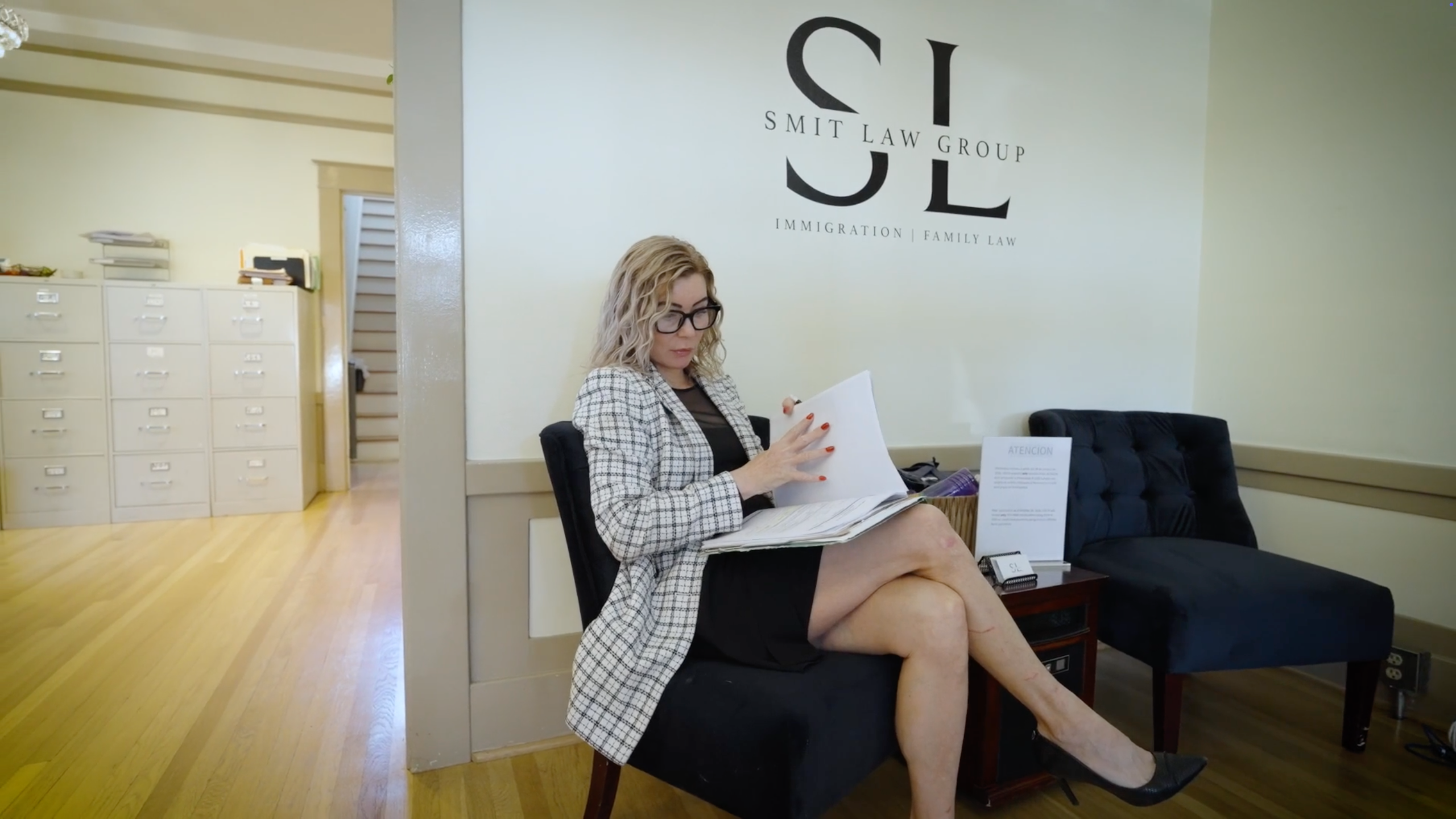Reno Family Petitions Lawyer
Why Hire SMIT LAW GROUP to handle your case?
- 5-star client reviews.
- Experience in both immigration and family law.
- Multilingual, global-mindset legal team.
- Proactive communication and clear case updates.
- Local Reno presence, ready to serve.
- Strategic approach to complex cases.
Find Out How We Can Help
Schedule Your ConsultationFor Help Exploring All Options for Bringing Spouses, Children, and Parents to the U.S., Consult Our Experienced Family-Based Petitions Attorney in Reno, NV

Having family members in the United States could present a streamlined path to immigration, but there are numerous challenges standing in the way. With the guidance and representation of a Reno family petitions lawyer at Smit Law Group, you can begin this process equipped with the full knowledge and resources you need.
Our law firm handles every aspect of family-based immigration, from petitions that help qualifying relatives obtain Green Cards to foreign fiancé(e) visas and more. We work to unite families in all stages of the process, from initial filings of application forms to preparing for consular processing or Adjustment of Status requirements.
The sooner you consult our firm for guidance, the sooner your relative’s immigration journey can begin. Contact us today to discuss your unique situation with our experienced immigration law firm.
What Is a Family-Based Petition?
A family-based petition is a way for U.S. citizens and, in some circumstances, lawful permanent residents (Green Card holders) to sponsor qualifying family members to obtain a Green Card. Immigration through a family-based petition requires a petitioner (the U.S. citizen or lawful permanent resident) to file Form I‑130, Petition for Alien Relative, with United States Citizenship and Immigration Services (USCIS).
Filing Form I-130 does not grant immigration status or a Green Card. It simply establishes that a qualifying family relationship exists between the petitioner and the beneficiary (your relative). To obtain lawful permanent resident status, the relative immigrating to the United States must complete additional steps.
Your future deserves attention today. Call 775-993-2235 or contact our team to schedule a consultation. We’re here to help you move forward with confidence.

Who Can File Family-Based Immigration Petitions, and Who Can Be Sponsored
Only certain categories of relationships qualify for specific immigration benefits under a family-based petition. Working with a Reno family petitions lawyer from the start can help you assess eligibility, consider all of your options, and manage the entire immigration process.
Who Can File
Eligibility for sponsoring relatives to immigrate to the United States depends on whether the sponsor is a U.S. citizen or a lawful permanent resident.
A U.S. citizen may file an I-130 for:
- Their spouse
- Their unmarried child under 21
- Their parent (if the citizen is at least 21 years old)
- Their sibling (though siblings fall under a slower preference category)
A lawful permanent resident may also file Form I-130 to sponsor relatives’ journeys to the United States on a permanent basis, but the categories of relatives they may file for are more limited. A Green Card holder may only file for:
- Their spouse
- Their unmarried child (under or over age 21)
Even for the petitioner, filing a family-based immigration petition isn’t easy. It requires a considerable amount of paperwork and documentation, and any omissions or inconsistencies could result in delays or application denials. That’s why legal guidance is so valuable.
Which Relatives Qualify
Different relatives may qualify for sponsorship depending on their relation to the petitioner and the petitioner’s status (U.S. citizen or Green Card holder). Generally, relationships that can qualify for some sort of family-based petition sponsorship include:
- Spouse of a U.S. citizen
- Spouse of a Green Card holder
- Child of a U.S. citizen
- Child of a Green Card holder
- Parent of a U.S. citizen at least 21 years of age
- Brothers and sisters of U.S. citizens
Spouses, parents, and children are the most common and more favorable relationships to sponsor.
Understanding Family Categories
U.S. immigration law divides family-based Green Card cases into two main categories: Immediate Relatives (IR) and Family Preference (F) categories. Relatives in different categories are subject to different restrictions, and the exact nature of their relationship with the sponsor can drastically affect the time it takes to attain a Green Card.
The Immediate Relatives category covers the closest family relationships of U.S. citizens only (not Green Card holders). Immediate relatives are given the highest priority under immigration law, with no annual cap or visa limit for these relationships. That means once the I-130 petition is approved, a visa is immediately available, making the process faster and more straightforward. Immediate relatives are limited to spouses of U.S. citizens, parents of U.S. citizens age 21 or older, and unmarried children, younger than 21, of U.S. citizens.
The Family Preference Categories encompass all other qualifying family relationships, including all relatives that a Green Card holder may sponsor. The family-preference system is divided into numbered groups (F1 through F4).
- F1: Unmarried adult sons and daughters, age 21 or older, of U.S. Citizens
- F2: Spouses and unmarried children under age 21 of lawful permanent residents, who qualify as F2A, and unmarried sons and daughters age 21 or older of lawful permanent residents, who qualify as F2B beneficiaries
- F3: Married sons and daughters of U.S. citizens, potentially including their spouses and minor children as derivatives
- F4: Brothers and sisters of U.S. citizens age 21 or older, whose spouses and minor children may immigrate as derivatives
Under the family preference system, beneficiaries are still subject to annual visa caps that create waiting periods that vary depending on demand and country of origin. For example, even F1 family preference beneficiaries are subject to annual visa limits. As this is one of the highest-demand categories, these beneficiaries may face significant waiting periods, potentially amounting to several years or more.
For help understanding the level of preference for which your family member can qualify and the likely wait times they are facing, turn to our Reno family petitions lawyer.
The Step-by-Step Process of Securing a Green Card Via a Family-Based Petition
Acquiring lawful permanent resident status starting with a family-based petition is a multi-step process. Filing an I-130, or even getting that application approved, does not guarantee a Green Card. Here’s the process that families in and near Reno can expect to go through.
1. Gather eligibility and relationship evidence
Confirm that you (the petitioner) are eligible to sponsor a beneficiary in the intended category and that the family relationship qualifies. You should gather the documentation you will need to support your application, such as:
- Proof of petitioner’s status as a U.S. citizen or Green Card holder
- Marriage certificate if filing for a spouse
- Birth certificate if filing for a child or parent
Because the rules regarding eligibility can be complex, it often helps to have professional legal guidance even at this early stage.
2. File Form I-130 with USCIS
The next step is for the petitioner (the U.S. citizen or lawful permanent resident) to fill out the I-130 form. You may be able to file online (if eligible) or by mail, depending on current USCIS rules.
The form must be completed fully and accurately and include required supporting documents, as well as payment of the proper filing fee.
3. Obtain USCIS Application Approval
Once you have submitted Form I-130, you need to wait for USCIS to process the application. If all goes well and the application is approved, further processing is needed. However, USCIS may also deny the application if there are errors in your paperwork. If additional information or documentation is required, USCIS may issue a Request for Evidence.
Processing times for Form I-130 petitions vary significantly depending on category, country of origin, and current backlog.
4. Undergo Adjustment of Status or Consular Processing
Approval of the petition is only the first step. The beneficiary must still meet all eligibility requirements for the Green Card. The next step in the process depends on whether the beneficiary seeking lawful permanent resident status is inside or outside the United States.
- Adjustment of Status: If the beneficiary is already in the U.S. and eligible, they may file for Adjustment of Status to become a permanent resident without leaving the country.
- Consular processing: If the beneficiary is outside the U.S., the case moves to the National Visa Center (NVC). The beneficiary will apply for an immigrant visa at the U.S. consulate in their home country for admission into the United States as a permanent resident.
5. Receive Permanent Residency
The outcome of a successful family-based petition is receiving a Green Card that confers lawful permanent resident status. Once consular processing or Adjustment of Status resolves in your favor, the beneficiary becomes a Green Card holder.
However, there are some restrictions to be aware of. For example, for a spouse of a U.S. citizen in a marriage that is less than two years old at the time that residence is granted, the Green Card is conditional, valid for only two years. Further filing of Form I-751 is needed to remove the conditions.
Having a family-based petitions attorney in Reno, NV, guiding you throughout every stage of the process ensures that you won’t be blindsided by restrictions or conditions and that you’re prepared to address any demands that lie ahead.
Challenges a Family-Based Petitions Attorney in Reno, NV, Can Help You Overcome
Although sponsorship through a family relationship can provide a pathway to immigration, acquiring a Green Card still is not a simple process. There are numerous issues that can arise, including:
- Inconsistencies or omissions in paperwork or documentation, potentially leading to delays or denials
- Beneficiary admissibility issues, including previous visa overstays, immigration violations, health issues, and criminal record, that can complicate or block the process
- Change in law or policy that may affect immigration processes
- Questions over the right path (Adjustment of Status vs. consular processing) if the beneficiary is already in the U.S., as well as how to maintain lawful status during processing
- Conditional residence that may apply in certain circumstances and the additional obligations the beneficiary has to remove these conditions before expiration
- Timing expectations and delays, which can vary depending on the category assigned, the beneficiary’s country of origin, and immigration backlogs
Working with an experienced Reno family petitions lawyer helps you stay ahead, proactively managing the aspects of the process that are within your control and understanding what to expect from the aspects outside of your control.
How Smit Law Group Can Help
At Smit Law Group, we provide the legal support families need for every stage of the immigration process. We’re ready to help you:
- Determine which relatives qualify under U.S. immigration law
- Understand how long your family may have to wait for a visa
- Navigate the Visa Bulletin and priority dates
- Ensure all filings are accurate and strategic to avoid unnecessary delays
- Document the eligibility of the petitioner
- Check for issues like prior removals, criminal record, immigration history, and other factors that can affect the admissibility of the beneficiary
- Establish that the relationship between the petitioner and the beneficiary is bona fide and qualifies for sponsorship
- Strategically determine the best next steps, whether they entail Adjustment of Status within the country, consular processing abroad, or seeking an immigration waiver if necessary
For Reno families sponsoring relatives abroad, legal guidance throughout this process provides peace of mind and the resources and knowledge to prepare for every stage. Shifting visa availability and eligibility rules, complex family preference categories, and country-specific wait times all make immigration through family-based petitions complicated, but we can help streamline the process.
Why Choose Smit Law Group as Your Reno Family Petitions Lawyer?
Who you choose to guide your family through the immigration process matters. At Smit Law Group, we’re here to serve you as an advocate who is experienced, empathetic, and often able to serve clients in their native language.
Experience in Legal Practice
Our team at Smit Law Group has served individuals and families near Reno since July 2014, providing dedicated assistance for matters of immigration and family law. Attorney Margaretha "Greta" Smit has 19 years of experience in legal practice.
An Immigrant’s Insider Perspective
As an immigrant herself, Greta Smit knows what it’s like to go through the challenges of the immigration process. Our firm brings empathy and firsthand understanding of the fears and concerns our clients face to every immigration case we handle.
Multilingual Immigration Law Services
We know how language barriers can add challenges to an already complicated process. Attorney Greta Smit’s knowledge of English, Spanish, Dutch, German, and French allows her to serve clients from a variety of backgrounds in their own language for clearer communication.
Contact a Reno Family Petitions Lawyer at Smit Law Group Today for an Initial Consultation
At Smit Law Group in Reno, our immigration attorney provides knowledgeable, compassionate support to help families understand which category applies to their situation, interpret the U.S. Department of State’s Visa Bulletin, and plan strategically to keep the process moving as efficiently as possible.
For help from a family-based petitions attorney in Reno, NV, contact Smit Law Group online or call 775-993-2235 today.
